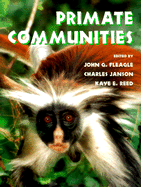Book contents
- Frontmatter
- Contents
- List of contributors
- Preface
- 1 African primate communities: Determinants of structure and threats to survival
- 2 Biomass and use of resources in south and south-east Asian primate communities
- 3 Species coexistence, distribution, and environmental determinants of neotropical primate richness: A community-level zoogeographic analysis
- 4 Primate communities: Madagascar
- 5 Primate diversity
- 6 Phylogenetic and temporal perspectives on primate ecology
- 7 Population density of primates in communities: Differences in community structure
- 8 Body mass, competition and the structure of primate communities
- 9 Convergence and divergence in primate social systems
- 10 Of mice and monkeys: Primates as predictors of mammal community richness
- 11 Comparing communities
- 12 Large-scale patterns of species richness and species range size in anthropoid primates
- 13 The recent evolutionary past of primate communities: Likely environmental impacts during the past three millennia
- 14 Resources and primate community structure
- 15 Effects of subsistence hunting and forest types on the structure of Amazonian primate communities
- 16 Spatial and temporal scales in primate community structure
- 17 Primate communities in Africa: The consequences of long-term evolution or the artifact of recent hunting?
- 18 The future of primate communities: A reflection of the present?
- 19 Concluding remarks
- Systematic index
- Subject index
15 - Effects of subsistence hunting and forest types on the structure of Amazonian primate communities
Published online by Cambridge University Press: 21 August 2009
- Frontmatter
- Contents
- List of contributors
- Preface
- 1 African primate communities: Determinants of structure and threats to survival
- 2 Biomass and use of resources in south and south-east Asian primate communities
- 3 Species coexistence, distribution, and environmental determinants of neotropical primate richness: A community-level zoogeographic analysis
- 4 Primate communities: Madagascar
- 5 Primate diversity
- 6 Phylogenetic and temporal perspectives on primate ecology
- 7 Population density of primates in communities: Differences in community structure
- 8 Body mass, competition and the structure of primate communities
- 9 Convergence and divergence in primate social systems
- 10 Of mice and monkeys: Primates as predictors of mammal community richness
- 11 Comparing communities
- 12 Large-scale patterns of species richness and species range size in anthropoid primates
- 13 The recent evolutionary past of primate communities: Likely environmental impacts during the past three millennia
- 14 Resources and primate community structure
- 15 Effects of subsistence hunting and forest types on the structure of Amazonian primate communities
- 16 Spatial and temporal scales in primate community structure
- 17 Primate communities in Africa: The consequences of long-term evolution or the artifact of recent hunting?
- 18 The future of primate communities: A reflection of the present?
- 19 Concluding remarks
- Systematic index
- Subject index
Summary
INTRODUCTION
Diurnal primates contribute a conspicuous component of the tropical forest vertebrate fauna (Terborgh, 1983; Bourlière, 1985), and are considered to be fair game species by subsistence and market hunters in most African (Fa et al., 1995; Oates, 1996; McRae, 1997), southeast Asian (Bennett et al., in press), and neotropical forests (Redford & Robinson, 1987; Peres, 1990). This is particularly the case for large-bodied species that are preferred by hunters because they yield the most amount of meat per unit of ammunition cost (Peres, 1990; Bodmer, 1995).
As sources of protein, however, primates are largely incompatible with a sustainable harvest regime because of their small litter sizes (typically one), long interbirth intervals, delayed age of first reproduction, heavy burden of prolonged parental investment, and in most species, severe competition for reproductive opportunities among the breeding members of the population (Smuts et al., 1987). These life-history and socioecological characteristics usually result in extremely low per capita reproductive rates which largely explain why primates and other long-lived mammals sharing a similar reproductive biology are so prone to severe reductions in numbers, if not local extinctions, when exposed to even relatively light hunting regimes. Yet overhunting of tropical forest vertebrates is now a rampant and nearly universal phenomenon (Robinson & Redford, 1991; Redford, 1992; Robinson & Bennett, in press), rendering primates particularly susceptible to widespread and profound shifts in population and community structure.
Information
- Type
- Chapter
- Information
- Primate Communities , pp. 268 - 283Publisher: Cambridge University PressPrint publication year: 1999
Accessibility standard: Unknown
- 28
- Cited by
